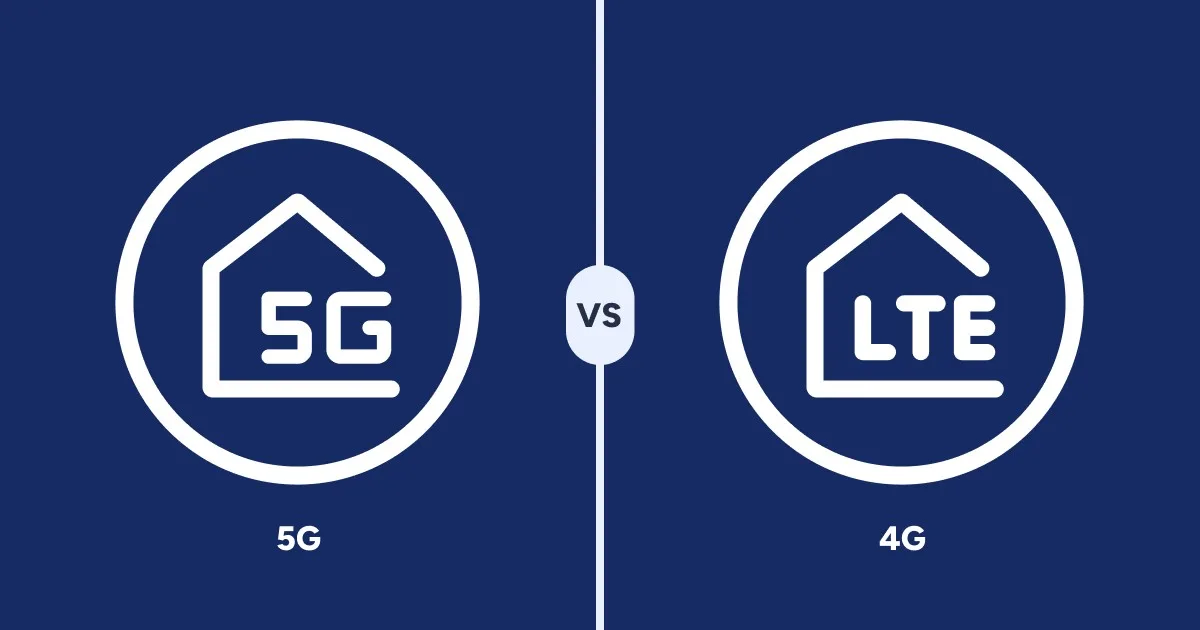The Best No-Contract Internet Plans of 2026
Get flexible service and reliable speeds with no strings attached
Feb 12, 2026 | Share
Brand Guides
-
Best no-contract planRely Home Internet
- Price: $50/mo.*
w/ AutoPay, plus taxes & fees. - Connection type: Fixed wireless
- Speeds: Up to 498Mbps
- Price: $50/mo.*
-
Best customer experienceFios 300 Mbps
- Price: $49.99/mo. w/Auto Pay†
- Connection type: Fiber
- Speed: Up to 300Mbps
-
Best upgrade from DSLQuantum Fiber 200 Mbps
- Price: Starting at $45.00/mo.‡
- Connection type: Fiber
- Speed: Up to 200Mbps
Looking for a more flexible internet plan?
See what’s available in your area by entering your zip code below.
On this page:
What to look for | Best overall: T-Mobile | #2: Verizon | #3: Quantum Fiber |#4: Frontier | #5: Optimum | #6: AT&T | Our verdict | FAQ
On this page:
Our pick: Which no-contract internet is best?
T-Mobile 5G Home Internet is the best provider out there if you want easy installation, low prices, and no strings attached. There are no upfront costs or hidden fees, and you can get a full refund within 15 days if you don’t like the service.
Better yet, you can save by bundling T-Mobile cell service with your home internet plan and get $15 off your monthly internet bill.
Best no-contract internet plans
| Plan | Price | Download speed |
|---|---|---|
| T-Mobile Rely Home Internet | $50/mo.* w/ AutoPay, plus taxes & fees. | Up to 498Mbps |
| Verizon Fios 300 Mbps | $49.99/mo.† w/AutoPay | Up to 300Mbps |
| Quantum 200 Mbps | Starting at $45/mo.‡ | Up to 200Mbps |
| Frontier Fiber 500 | $44.99/mo.§ w/ Auto Pay and Paperless Bill | Up to 500Mbps |
| Optimum 200 Mbps Internet | $25/mo.║ | Up to 200Mbps |
| AT&T Fiber Internet 300 | $55/mo.# | Up to 300Mbps |
Data effective 01/26/2026. Offers and availability may vary by location and are subject to change. See disclaimers.
What should you look for in a no-contract internet plan?
Not having to sign a contract is nice, but that’s not all you need in a good internet plan. Here’s what we look for in plans we recommend:
- A plan you can actually get at your home address
- Reliable speeds of at least 200Mbps
- Prices in the range of $50 per month
- No data caps or hidden fees
- No big price hikes within a few months
Let’s get into it.
A plan you can actually get
We review some amazing plans across the country, but we limited this article to plans that are widely available. Because who cares about great customer service and low prices if you can’t get the service at your address?
That’s why T-Mobile Home Internet is our top pick. It’s available in more than 60 percent of places studied by the Federal Communications Commission. Easy availability also lands AT&T and Verizon internet near the top of our list.
Unfortunately, this means we left out some amazing no-contract providers. If you can get Google Fiber or Ziply Fiber where you live, for example, we highly recommend it.
Speeds of at least 200Mbps
You need an internet plan with speeds fast enough to meet your everyday needs. For most households, that means a plan of about 200Mbps. That will support a family of four gaming, streaming, surfing, and checking email at the same time. If you have a bigger family or need to host a lot of video calls, you might want faster speeds.
But there’s no reason to pay for more than you need!
If you’re not sure if 200Mbps is fast enough for you, there’s an easy way to find out.
Find out how much speed you need
How Much Internet Speed Do You Need?
Est. time: 60 seconds
Answer 6 questions and get a personalized internet speed recommendation!
How many people in your household use the internet/WiFi on a daily basis?
How many devices in your home connect to the internet, including tablets, gaming consoles, and smart devices?
How many people in your household work from home?
What video quality do you use for streaming TV and movies?
How intensely does your household participate in online gaming?
Does your household download large files from the cloud or via the internet?
Price of about $50 per month
The best internet plans cost about $50 per month. How do we know? We analyzed our complete database and talked to hundreds of customers across the country for our 2024 Annual Provider Review.
Fortunately, more and more plans in that price range now come without contracts (and the early termination fees those contracts require). Choosing one of these plans means you’re free to switch providers any time, for any reason.
Internet service has historically been controlled by local provider monopolies, but that’s slowly changing. As a customer, you deserve to benefit.
No data caps
If you’re looking for a low-cost plan you can rely on, you don’t want to worry about extra fees for strict data caps. That’s why we recommend no-contract plans that never charge extra, no matter how much data you use.
There are a few caveats to know, though. Plans can differ from place to place, so read your terms and conditions carefully. Second, some 5G home internet providers slow your speeds dramatically if you exceed certain data thresholds within a month. These limits are pretty high, so we don’t think they will be a problem for most folks.
No hidden fees
Low prices don’t matter much if a bunch of junk fees get tacked onto your bill every month. The no-contract plans we recommend have no cancellation fees and no mysterious fees (like a Wi-Fi access fee or an infrastructure improvement fee). Most of our top plans even give you Wi-Fi equipment rental included with your bill.
The price you’re quoted should be the price you pay.
No big price hikes in a few months
Some of the cheapest plans out there are only cheap for a few months. That’s because you sign up for a promotional rate that reverts to a standard rate once the promotional period is over. Then, you’re strongly encouraged to use autopay so you don’t notice the increase. We’re all about saving money, but some of these deals are pretty shady—and should be avoided.
That’s why we’ve chosen the best no-contract plans that come with stable pricing for at least a year. At that point, it’s a good idea to shop for internet service again anyway.
Do you need fiber?
Fiber internet is great if you can get it, but it’s not absolutely necessary. Fiber networks are fast, reliable, and rarely require maintenance. However, recent improvements to cable internet technology make it more reliable than ever. Fixed wireless 5G home internet is also quite reliable, and fast enough for most households (even if you work from home).
That said, fiber internet rarely requires contracts or comes with extra fees. If you have the option to switch to fiber internet where you live, you probably should.
The best no-contract 5G internet plan: T-Mobile Rely Home Internet
Specs:
- Download speed: Up to 498Mbps
- Type: Fixed Wireless
- Cost: $50/mo.* w/ AutoPay, plus taxes & fees.
View Plans for T-Mobile Home Internet
Plan data as of 02/12/2026. Offers and availability may vary by location and are subject to change. See disclaimers.
We love T-Mobile’s 5G home internet for its low monthly price, easy setup, and nationwide availability. There are no hidden fees, no contracts to worry about, and no data overage fees. Its 15-day money-back guarantee sweetens the deal.
In our testing, T-Mobile 5G Home Internet was fast enough to work from home and stream video on a few devices at a time.
Be aware that T-Mobile’s home internet uses the same network as its mobile plans, so if you can’t get a good signal on your 5G phone, you might not get a great signal with your T-Mobile home internet gateway. Your speeds may also be deprioritized relative to cell communications, which can be a problem if the network is busy.
 Pros:
Pros:
- Affordable monthly rates
- No contracts and no hidden fees
- Simple setup and account management with a five-star mobile app
 Cons:
Cons:
- Less reliability than fiber internet
- Speeds may not support large households
- The best prices reserved for customers who bundle with phone service
Best customer experience: Verizon Fios 300 Mbps
Specs:
- Download speed: Up to 300Mbps
- Type: Fiber
- Cost: $49.99/mo.† w/Auto Pay
View Plans for Verizon Home Internet
Plan data as of 12/30/2025. Offers and availability may vary by location and are subject to change. See disclaimers.
We love Verizon Fios internet for its excellent customer service, excellent reliability, and no-fuss billing. With the 300Mbps plan, you get all that for a low monthly price that includes equipment fees.
Verizon Fios offers 100% fiber connections in the Northeast, in states from New York and Massachusetts to Virginia. If you can get Verizon in those areas, we think you should. And if you need more speed than 300Mbps, you have a choice of plans all the way up to 2Gbps.
If you live outside Verizon’s fiber network, you might still be able to get a great no-contract plan from Verizon using its 5G home internet services. Prices are low, especially if you bundle with Verizon phone service, and speeds are fast enough to meet the needs of most households. Installation is easy, too, and you have two speed tiers to choose from.
 Pros:
Pros:
- Ultra-reliable fiber network
- No hidden fees, contracts, or data limits
- Low monthly prices
 Cons:
Cons:
- Fiber plans limited to the Northeast
- Cheapest 5G home internet plans require cell phone bundling
Best upgrade from DSL: Quantum Fiber 200 Mbps
Specs:
- Download speed: Up to 200Mbps
- Type: Fiber
- Cost: Starting at $45.00/mo.‡
View Plans for Quantum Fiber
Plan data as of 12/30/2025. Offers and availability may vary by location and are subject to change. See disclaimers.
Quantum Fiber ups the ante on no-contract plans by adding a Price for Life guarantee for new customers. Better yet, it offers a fast, symmetrical 200Mbps plan for less than $50 per month, equipment included. You also get unlimited data, like you would with most other fiber internet providers.
Installation is usually free, but if getting it set up at your house costs Quantum Fiber more than $1,500, you could be asked to make up the difference.
You should also know the fine print. Quantum Fiber could start charging for Wi-Fi equipment in the future, which would be a bummer. The company could also change its plan structure, and that would do away with the guarantee. But if your other options are cable or fixed wireless internet, take a chance on Quantum Fiber.
 Pros:
Pros:
- Price for Life guarantee
- Reliable fiber internet
- Wi-Fi equipment included
 Cons:
Cons:
- Some customers may be charged for installation
- Equipment prices could go up in the future
Best value fiber: Frontier Fiber 500
Specs:
- Download speed: Up to 500Mbps
- Type: Fiber
- Cost: $44.99/mo.§ w/ Auto Pay and Paperless Bill
View Plans for Frontier
Plan data as of 12/30/2025. Offers and availability may vary by location and are subject to change. See disclaimers.
Frontier internet is our value 2024 champion among all internet providers we review, and it’s a great option if you’re looking for a plan that doesn’t require a contract. We love that you can get speeds of up to 500Mbps for less than $50 per month, and you can get it all without paying equipment fees. Frontier doesn’t charge data overage or installation fees either.
We like Frontier, but there are some important things to know. First, if you accept a gift card offer when you sign up, you could be forced into a contract with early termination fees up to $100. Second, the low price reverts to standard rates after 12 months. Right now, that’s an increase of $10 per month. That’s still not a bad price for the speed, but we prefer to see prices that start low and stay low.
 Pros:
Pros:
- Fast speeds for low starting prices
- Free installation and included Wi-Fi equipment
- No data caps
 Cons:
Cons:
- Contracts required if you get a gift card deal
- Prices that go up after 12 months
- Fiber not available in some areas
Best introductory rates: 200 Mbps Fiber Internet
Plan data as of 02/05/2026. Offers and availability may vary by location and are subject to change. See disclaimers.
Optimum 200 Mbps Fiber Internet is an amazing deal. There are no data caps, and it’s cheaper than most no-contract cable and DSL plans. This means that you’ll have a connection reliable enough for streaming, working from home, and gaming. You also get included Wi-Fi equipment, so the price you see at checkout is the price you pay.
Unfortunately, Optimum charges $100 for professional installation, but you may be able to self-install if the address has had fiber internet service from Optimum before.
We love that there are no cancellation fees, and the five-year price lock on offer now is great. Usually, though, Optimum hikes prices by $15 per month in the second and third years of service. You can get out of the price hikes with certain bundle deals, but they’re notoriously confusing and difficult to manage. Pay special attention to the fine print during checkout.
 Pros:
Pros:
- Cheap monthly prices
- Included equipment
 Cons:
Cons:
- Big price hikes after a year
- Possible $100 installation fee
Best fiber in the South: AT&T Fiber Internet 300
Plan data as of 01/05/2026. Offers and availability may vary by location and are subject to change. See disclaimers.
AT&T fiber internet costs a little more every month than our $50 benchmark, but we still think it’s a great option for no-contract internet. You get symmetrical fiber speeds plus no contracts, no data caps, and no price hikes in a few months. Wi-Fi equipment is included, too, plus a free security suite and an intuitive mobile app.
AT&T Fiber is available in cities throughout the South and in California, and it’s a great alternative to cable or DSL internet. If you can’t get AT&T Fiber, you may be able to get the company’s 5G home internet service: AT&T Air. Like with the fiber plans, the cost is $55 per month.
 Pros:
Pros:
- Reliable fiber internet
- No data caps, contracts, or price hikes
- Wi-Fi equipment included
 Cons:
Cons:
- Higher prices than some fiber competitors
Our verdict: Get T-Mobile 5G Home Internet
T-Mobile home internet has been taking the internet world by storm, and for good reason. It comes at a great price, simplified pricing, and free Wi-Fi gear. Plus, it’s fast enough for most homes.
It’s all even cheaper if you bundle with a mobile phone plan—and you probably should. T-Mobile has the biggest 5G network in the country and is spending a big chunk of change on additional spectrum, which makes it more reliable than ever.
You can get similar perks from a lot of fiber internet providers like Verizon, AT&T, and Google Fiber. And all are great picks! However, they are tied to specific locations and therefore hard to get. T-Mobile, on the other hand, reaches almost every urban and suburban home in the country, and you can get it as long as there’s excess cell capacity on local towers.
Additional no-contract plans
If you can’t get one of our top six plans, there’s still hope!
The following providers have small networks and may have prices outside our $50 target or unusual fees, but offer good no-contract plans.
| Plan | Price | Type | Download speed |
|---|---|---|---|
| WOW Internet 300 | $30/mo.* | Cable | Up to 300Mbps |
| Ziply Fiber 300/300 | $30/mo.† | Fiber | Up to 300mbps |
| Kinetic Internet 300 Mbps | $39.99/mo.‡ w/ AutoPay for 12 mos. | Cable, fiber | Up to 300Mbps |
| Spectrum Internet® Premier | $50/mo.§ for 12 mos. | Cable | Up to 500Mbps |
| CenturyLink Simply Unlimited Fiber Internet up to 500 Mbps | $50/mo.║ | Fiber | Up to 500Mbps |
| Sparklight FlexConnect 300 | $45/mo. | Cable | Up to 300Mbps |
| Google Fiber Core 1 Gig | $70/mo.** | Fiber | Up to 1,000Mbps |
Data effective 12/30/2025. Offers and availability may vary by location and are subject to change.
See disclaimers.
FAQ about no-contract internet
What is a short-term internet contract?
How much does no-contract internet service cost?
What is the best no-contract internet service?
Which no-contract internet plans are available in rural areas?
How do I get out of my internet contract?
Disclaimers
The Best No-Contract Internet Plans
*T-Mobile
Guarantee exclusions like taxes and fees apply.
†Verizon Fios
Price per month with Auto Pay & without select 5G mobile plans. Consumer data usage is subject to the usage restrictions set forth in Verizon’s terms of service; visit: https://www.verizon.com/support/customer-agreement/ for more information about 5G Home and LTE Home Internet or https://www.verizon.com/about/terms-conditions/verizon-customer-agreement for Fios internet.
§Frontier
w/ Auto Pay & Paperless Bill. Max wired speed 500/500 Mbps. Wi-Fi, actual & average speeds vary. One-time charges apply.
║Optimum
w/ $10/mo. elig. Auto Pay & Paperless Bill. Wired connection. WiFi speeds may vary. Not available in all areas. Disney+, Hulu Bundle Basic avail. w/ 500 Mbps Internet and above. After promo period, plan auto-renews at $10.99/mo. Offer will not replace existing subscriptions. Add’l terms apply. Unlimited Mobile line w/ Promo Code HEYITSFREE. Plus taxes & fees. Savings via monthly bill credits. Elig. cust. only. Paperless Bill & Auto Pay req’d. Terms Apply.
#AT&T Fiber
Above pricing is after $10/mo Autopay & Paperless bill discount with a debit card or bank account; if using a credit card, then price is $5/mo more. Pricing includes Equipment Fee. Up to $99 install fee may apply, plus tax where applicable.
‡Quantum
Limited availability. Service rate in select locations only. Taxes and fees apply. New Quantum Fiber Customers Only.
Additional no-contract plans
*WOW
Price per month with AutoPay. Taxes and equipment extra. Package not available in all areas.
†Ziply Fiber
For new residential customers only. No annual contract required. Prices shown are before taxes and fees and require autopay and paperless billing.
‡Kinetic
AutoPay Required to Achieve Advertised Price
§Spectrum
Limited time offer; subject to change; new residential customers only (no Spectrum services within past 30 days) and in good standing with Spectrum. Taxes and fees extra in select states. SPECTRUM INTERNET: Standard rates apply after promo period. Additional charge for installation. Speeds based on wired connection. Actual speeds (including wireless) vary and are not guaranteed. Gig capable modem required for Gig speed. For a list of Gig capable modems, visit spectrum.net/modem. Services subject to all applicable service terms and conditions, subject to change. Not available in all areas. Restrictions apply.
║CenturyLink
Limited availability. Service and rate in select locations only. Paperless billing required. Taxes and fees apply.
#Sparklight
For the first 12 mos. w/ Auto Pay & Paperless Billing*. $60/mo. Reg price.
**Google Fiber
Plus taxes and fees. Upload/download speed and device streaming claims are based on maximum wired speeds. Actual Internet speeds are not guaranteed and may vary based on factors such as hardware and software limitations, latency, packet loss, etc.
Author - Chili Palmer
Chili Palmer covers home tech services, with a special focus on understanding what families need and how they can stay connected on a budget. She handles internet access and affordability, breaking news, mobile services, and consumer trends. Chili’s work as a writer, reporter, and editor has appeared in publications including Telecompetitor, Utah Business, Idaho Business Review, Benton Institute for Broadband & Society, and Switchful.com.
Editor - Jessica Brooksby
Jessica loves bringing her passion for the written word and her love of tech into one space at HighSpeedInternet.com. She works with the team’s writers to revise strong, user-focused content so every reader can find the tech that works for them. Jessica has a bachelor’s degree in English from Utah Valley University and seven years of creative and editorial experience. Outside of work, she spends her time gaming, reading, painting, and buying an excessive amount of Legend of Zelda merchandise.





